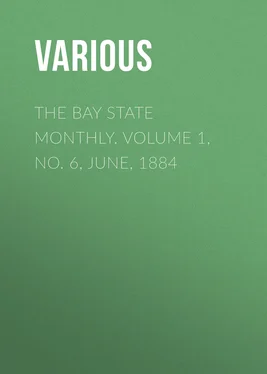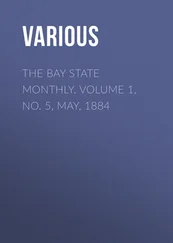Various - The Bay State Monthly. Volume 1, No. 6, June, 1884
Здесь есть возможность читать онлайн «Various - The Bay State Monthly. Volume 1, No. 6, June, 1884» — ознакомительный отрывок электронной книги совершенно бесплатно, а после прочтения отрывка купить полную версию. В некоторых случаях можно слушать аудио, скачать через торрент в формате fb2 и присутствует краткое содержание. Жанр: foreign_antique, periodic, foreign_edu, на английском языке. Описание произведения, (предисловие) а так же отзывы посетителей доступны на портале библиотеки ЛибКат.
- Название:The Bay State Monthly. Volume 1, No. 6, June, 1884
- Автор:
- Жанр:
- Год:неизвестен
- ISBN:нет данных
- Рейтинг книги:5 / 5. Голосов: 1
-
Избранное:Добавить в избранное
- Отзывы:
-
Ваша оценка:
- 100
- 1
- 2
- 3
- 4
- 5
The Bay State Monthly. Volume 1, No. 6, June, 1884: краткое содержание, описание и аннотация
Предлагаем к чтению аннотацию, описание, краткое содержание или предисловие (зависит от того, что написал сам автор книги «The Bay State Monthly. Volume 1, No. 6, June, 1884»). Если вы не нашли необходимую информацию о книге — напишите в комментариях, мы постараемся отыскать её.
The Bay State Monthly. Volume 1, No. 6, June, 1884 — читать онлайн ознакомительный отрывок
Ниже представлен текст книги, разбитый по страницам. Система сохранения места последней прочитанной страницы, позволяет с удобством читать онлайн бесплатно книгу «The Bay State Monthly. Volume 1, No. 6, June, 1884», без необходимости каждый раз заново искать на чём Вы остановились. Поставьте закладку, и сможете в любой момент перейти на страницу, на которой закончили чтение.
Интервал:
Закладка:
Various
The Bay State Monthly – Volume 1, No. 6, June, 1884
BENJAMIN FRANKLIN BUTLER
There is a belt extending irregularly across the State of New Hampshire, and varying in width, from which have gone forth men who have won a national reputation. From this section went Daniel Webster, Lewis Cass, Levi Woodbury, Zachariah Chandler, Horace Greeley, Henry Wilson, William Pitt Fessenden, Salmon P. Chase, John Wentworth, Nathan Clifford, and Benjamin F. Butler.
BENJAMIN FRANKLIN BUTLER was born in the town of Deerfield, New Hampshire, November 5, 1818.
His father, Captain John Butler, was a commissioned officer in the War of 1812, and served with General Andrew Jackson at New Orleans. As merchant, supercargo, and master of the vessel, he was engaged for some years in the West India trade, in which he was fairly successful, until his death in March, 1819, while on a foreign voyage. In politics he was an ardent Democrat, an admirer of General Jackson, and a personal friend of Isaac Hill, of New Hampshire.
Left an orphan when an infant, the child was dependent for his early training upon his mother; and faithfully did she attend to her duties. Descended from the Scotch Covenanters and Irish patriots, Mrs. Butler possessed rare qualities: she was capable, thrifty, diligent, and devoted. In 1828, Mrs. Butler removed with her family to Lowell, where her two boys could receive better educational advantages, and where her efforts for their maintenance would be better rewarded, than in their native village.
As a boy young Butler was small, sickly, and averse to quarrels. He was very fond of books, and eagerly read all that came in his way. From his earliest youth he possessed a remarkably retentive memory, and was such a promising scholar that his mother determined to help him obtain a liberal education, hoping that he would be called to the Baptist ministry. With this end in view, he was fitted for college at the public schools of Lowell and at Exeter Academy, and at the early age of sixteen entered Waterville College. Here for four years, the formative period of his life, his mind received that bent and discipline which fitted him for his future active career.
He was a student who appreciated his advantages, and acquired all the general information the course permitted outside of regular studies; but his rank was low in the class, as deportment and attention to college laws were taken into account. During the latter part of his course he was present at the trial of a suit at law, and was so impressed with the forensic battle he then witnessed, that he chose law as his profession. He was graduated from the college in 1838, in poor health, and in debt, but a fishing cruise to the coast of Labrador restored him, and in the fall he entered upon the study of the law at Lowell. While a student he practised in the police court, taught school, and devoted every energy to acquiring a practical knowledge of his profession.
MILITIA
While yet a minor he joined the City Guards, a company of the fifth regiment of Massachusetts Militia. His service in the militia was honorable, and continued for many years; he rose gradually in the regular line of promotion through every grade, from a private to a brigadier-general.
LAW
In 1840, Mr. Butler was admitted to the bar. He was soon brought into contact with the mill-owners, and was noted for his audacity and quickness. He won his way rapidly to a lucrative practice, at once important, leading, and conspicuous. He was bold, diligent, vehement, and an inexhaustible opponent. His memory was such, that he could retain the whole of the testimony of the longest trial without taking a note. His power of labor seemed unlimited. In fertility of expedient, and in the lightning quickness of his devices to snatch victory from the jaws of defeat, his equal has seldom lived.
For twenty years Mr. Butler devoted his whole energies to his profession. At the age of forty he was retained in over five hundred cases, enjoyed the most extensive and lucrative practice in New England, and could at that age have retired from active business with an independent fortune.
POLITICS
Despite his enormous and incessant labors at the bar, Mr. Butler, since early manhood, has been a busy and eager politician, regularly for many years attending the national conventions of the Democratic party, and entering actively into every campaign.
Before the Rebellion he was twice elected to the Massachusetts Legislature: once to the House in 1853, and once to the Senate in 1859; and was a candidate for governor in 1856, receiving fifty thousand votes, the full support of his party.
In April, 1860, Mr. Butler was a delegate to the Democratic convention held at Charleston. There he won a national reputation. In June, at an adjourned session of the convention, at Baltimore, Mr. Butler went out with the delegates who were resolved to defeat the nomination of Stephen A. Douglas. The retiring body nominated Mr. Breckinridge, of Kentucky, for the Presidency, and Mr. Butler returned home to help his election. It may be here stated that Mr. Breckinridge was a Southern pro-slavery unionist. Mr. Butler was the Breckinridge candidate for the governorship of Massachusetts, and received only six thousand votes.
In December, 1860, after the election of Abraham Lincoln was an established fact, there was a gathering of politicians at Washington, Mr. Butler among the rest. South Carolina had passed the ordinance of secession, and had sent commissioners or embassadors to negotiate a treaty with the general government. Mr. Butler told his Southern friends that they were hastening on a war; that the North would never consent to a disunion of the States, and that he should be among the first to offer to fight for the Union. He counselled the administration to receive the South Carolina commissioners, listen to their communication, arrest them, and try them for high treason. Mr. Butler foresaw a great war, and on his return to Massachusetts advised Governor Andrew to prepare the militia for the event. This was quietly done by dropping those who could not be depended upon to leave the State, and enlisting others in their stead. Arms and clothing were also prepared. On April 15, 1861, a telegram was received by Governor Andrew from Senator Henry Wilson asking for troops to defend the capital. A little before five o'clock, Mr. Butler was, trying, a case before a court in Boston, when Colonel Edward F. Jones, of the sixth regiment, brought to him for endorsement an order from Governor Andrew to muster his regiment forthwith on Boston Common, prepared to go to the defence of Washington. Two days later Mr. Butler received the order to take command of the troops.
IN THE WAR
General Butler's command consisted of four regiments. The sixth was despatched immediately to Washington by the way of Baltimore, two regiments were sent in transports to garrison Fortress Monroe, while General Butler accompanied the eighth regiment in person. At Philadelphia, on the nineteenth of April, General Butler was apprised of the attack on the sixth regiment during their passage through Baltimore, and he resolved to open communication with the capital through Annapolis.
At Annapolis, General Butler's great executive qualities came into prominence. He was placed in command of the "Department of Annapolis," and systematically attended to the forwarding of troops and the formation of a great army. On May 13, with his command, he occupied the city of Baltimore, a strategic movement of great importance. On May 16, he was commissioned major-general, and on the twenty-second was saluted as the commander of Fortress Monroe. Two days later, he gave to the country the expressive phrase "contraband of war," which proved the deathblow of American slavery.
Читать дальшеИнтервал:
Закладка:
Похожие книги на «The Bay State Monthly. Volume 1, No. 6, June, 1884»
Представляем Вашему вниманию похожие книги на «The Bay State Monthly. Volume 1, No. 6, June, 1884» списком для выбора. Мы отобрали схожую по названию и смыслу литературу в надежде предоставить читателям больше вариантов отыскать новые, интересные, ещё непрочитанные произведения.
Обсуждение, отзывы о книге «The Bay State Monthly. Volume 1, No. 6, June, 1884» и просто собственные мнения читателей. Оставьте ваши комментарии, напишите, что Вы думаете о произведении, его смысле или главных героях. Укажите что конкретно понравилось, а что нет, и почему Вы так считаете.












